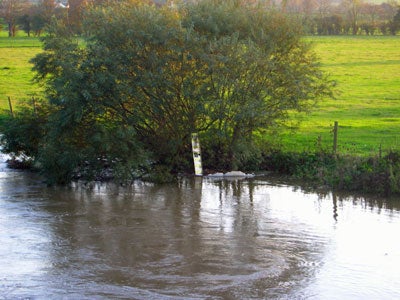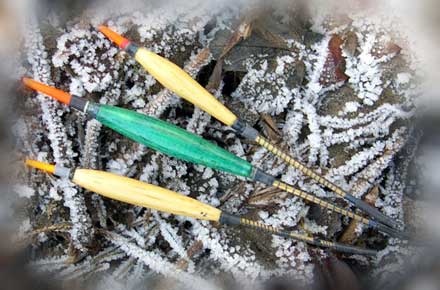| MARK WINTLE |
| Mark Wintle, an angler for thirty-five years, is on a quest to discover and bring to you the magic of fishing. Previously heavily involved with match fishing he now fishes for the sheer fun of it. With an open and enquiring mind, each week Mark will bring to you articles on fishing different rivers, different methods and what makes rivers, and occasionally stillwaters, tick. Add to this a mixed bag of articles on catching big fish; tackle design, angling politics and a few surprises. Are you stuck in a rut fishing the same swim every week? Do you dare to try something different and see a whole new world of angling open up? Yes? Then read Mark Wintle’s regular column. |
Wintle’s World of Angling – Winter Fishing, River or lake?ALTHOUGH I PROFESS a great love of river fishing, winter conditions often dictate that my weekend’s fishing venue will be wherever looks like the best prospect. What with floods, frosts, gales, icy blasts, there’s plenty to hinder our chances of catching. So what do I look for in getting the best out of winter fishing?
At the moment, I am very much concentrating on pole fishing and any opportunity to fish the pole is gladly taken. But with only Saturdays (occasionally Sunday afternoons) to try to get out fishing I am reliant on the conditions. Last years low river conditions meant that the rivers were fishable three weeks out of four and that’s where I concentrated my efforts. I am less bothered about catching big fish at present and much more concerned with developing and exploring what can be done with the pole. This means my current choice of venue is dictated by the following factors:- Can I fish the pole in comfort? Can I try out pole methods that are different to ones I’ve already tried? Will I get plenty of bites, with preferably some better fish? Both stillwaters and rivers are likely to fit the bill. I have access to many stillwaters within thirty miles as well as several rivers, so I’m spoilt for choice. There is currently one factor that’s making the decision for me every week though. After the drought of the last 18 months it has finally started raining in this part of the country. The best expression I can use to describe the Dorset Stour is ‘bouncing’. Even mid week it’s two or three feet above normal and very dirty. Come the weekend and it can be from six feet up and more, even across the fields (about eight feet up). Now I know that some barbel fanatics will tell me I’m missing out on some terrific fishing but much of the time I get the most pleasure from my fishing because of how I’m doing it rather than just what I catch. That often means floatfishing with finesse rather than what has aptly been described as ‘cod fishing’, ie, chucking half a pound of lead into a swollen river. It wasn’t much more than a month ago that I fished the upper Stour with chopped worm on a river that had a summer flow. Those days have gone for the foreseeable future. We shouldn’t complain; another four months of rain like this and the water table will be replenished. That leaves me with the stillwaters. At the time that I fished with Graham on the Thames (2nd November) we had a succession of frosts. Since then the unsettled weather has meant high temperatures for the time of year. Until much colder weather arrives that does mean that the stillwaters should still fish fairly well. As a result I’ve been catching just about everything present on the stillwaters – carp, goldfish, koi, perch, rudd, roach, bream, silver bream, tench and ide. When the rivers do finally settle, hopefully with mild conditions, I am looking for a roach bonanza. The roach should be hungry after several weeks of floods, and I might even get a chance to try out the lollipop float with bread flake, and also not forgetting the chopped worm method again for a big perch. From the foregoing you may have gathered that I like to fish fairly short sessions in winter; five hours is usually my maximum though exceptionally I’ll make a whole day of it. I think that to keep warm and interested when fishing in winter you need action, and plenty of it. I no longer have the time or patience to spend twelve days waiting for a bite. I want to be active, whether it’s trotting a float or working a pole. To that end I’ve identified a number of venues that can produce in winter. The river ones depend on the conditions but some of them will produce even when it’s low, clear and cold. Others are better when conditions are spot on – that means the river is slightly up but dropping with that perfect tinge of colour. On stillwaters the kiss of death is extreme cold. One or two frosts won’t affect some venues that I know although others can be killed dead.
Perhaps my nightmare weekend conditions is a deluge on a Thursday that puts the river completely out of sorts for the weekend with an immediate change to bitterly cold Northerlies on the Friday onwards with hard frosts, killing off the stillwater fishing in the process. In those circumstances I may try to find a tributary that settles much quicker than the main river where I can shelter from the cold wind yet get some sport with dace or grayling. This happened a year ago when Christchurch’s Xmas match was flooded off the Stour onto some of the Ringwood pits. Those drawn on a small lake complex had plenty of bites but the hard frost and freezing fog took its toll on the big lake where I was drawn. The very occasional small skimmer and odd bream were scant reward from a lake full of fish. If it had been mild with a good strong wind then the fish might have stirred into life but we were becalmed (and chilled in the freezing fog). I took an early bath and found the dace on a tiny stream for some tricky but rewarding fishing. So what’s the answer from these ramblings?The first requirement in winter is an open mind. It’s good to target specific fish but when the conditions are hopeless on the rivers perhaps a stillwater offers a better chance. It’s easy to get stuck in a rut of always fishing a river, or always a stillwater. But why suffer purgatory when a totally different approach can offer sport in adverse conditions. Perhaps you always lug a mountain of carp gear to a local pit. What if it’s frozen? Wouldn’t a couple of hours roving with just a float rod and reel, a few floats, shot, hooks, etc, and a pint of maggots be a welcome change? The second one is that by trying different waters you can get to know more venues that might produce when your more favoured ones don’t. Thirdly, I am not afraid to pack a venue in if it is clear I’ve misjudged the conditions. It could be that I thought the river was holding steady when in fact it was rising fast, or if after fishing it for an hour or two it is failing to produce. This is where knowing your venue really does count. You’ve got to have a clear idea of how quickly you expect a venue to respond. I know venues where you can catch almost immediately and yet others that will take at least an hour of patient feeding before there is a response, and a few that are unpredictable. I save the unpredictable ones for perfect conditions! Finally, be properly prepared, even for short sessions in winter. Take some food, hot soup in a flask, and decent clothing. |















